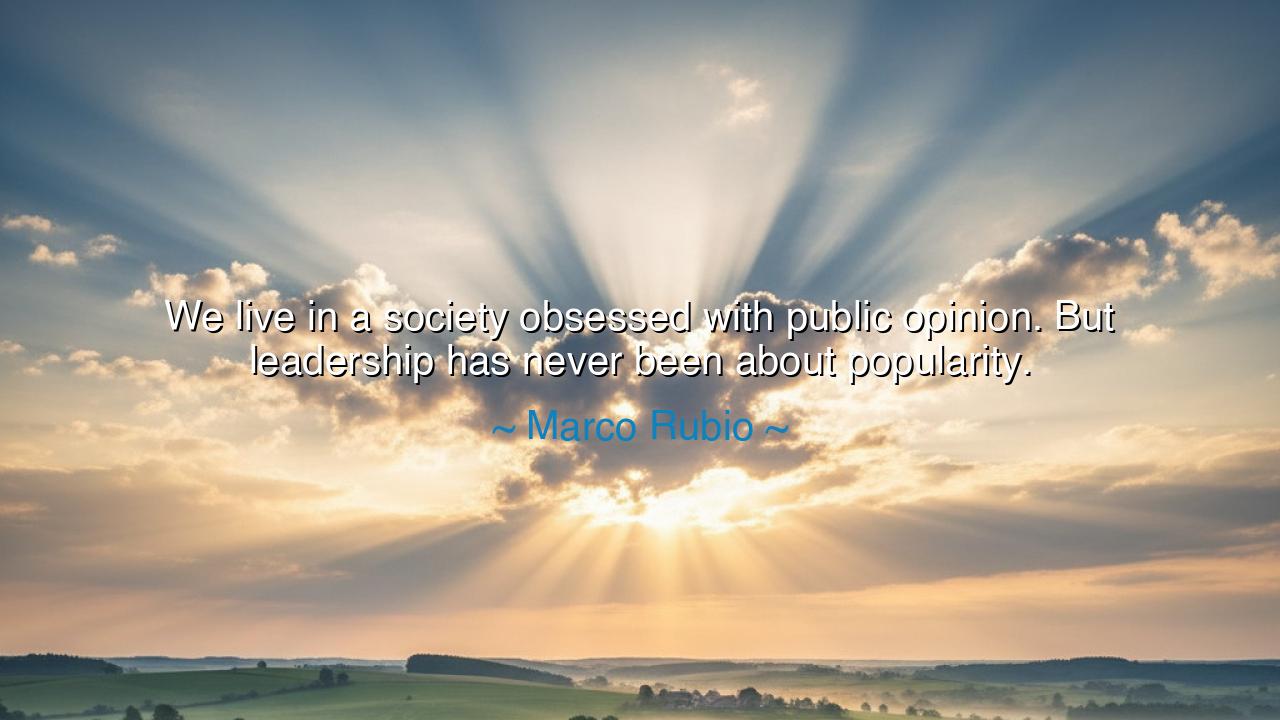
We live in a society obsessed with public opinion. But leadership
We live in a society obsessed with public opinion. But leadership has never been about popularity.






Hear the voice of Marco Rubio, who proclaimed: “We live in a society obsessed with public opinion. But leadership has never been about popularity.” These words rise as a cry against the illusions of our age, where voices clamor like waves in a storm, and men often mistake the roar of approval for the measure of greatness. Yet Rubio reminds us of the ancient truth: leadership is not the art of pleasing the crowd, but of guiding it—even when the path is steep, even when the people resist. For popularity is fleeting, but true leadership endures.
The obsession with public opinion is as old as democracy itself. In the agora of Athens, citizens raised their voices, and leaders often bent to their will to preserve favor. Yet the wisest among them, like Pericles, understood that leadership required vision, not flattery. To govern by popularity alone is to be tossed like a ship without a rudder, at the mercy of shifting winds. To lead with conviction is to set the sail toward what is right, regardless of how loudly the waves protest.
Consider the tale of Abraham Lincoln. In his time, he was reviled by many, mocked, despised, and even hated. His decision to preserve the Union through war was not popular, nor was his proclamation to free the enslaved embraced by all. Yet he carried the burden of responsibility, not the shallow cloak of approval. And though his life was cut short, history remembers him not for chasing popularity, but for embodying courage and principle. Here we see Rubio’s words alive: leadership is tested not in applause, but in storms.
The danger of equating popularity with leadership is that it breeds cowardice. The leader who fears disapproval will never act boldly, never speak truth when it is unwelcome, never defend justice when it costs him praise. Such a leader becomes a slave to the crowd, not its guide. Yet the crowd, like the sea, respects most the captain who stands firm at the helm, not the one who drifts aimlessly with every tide. True leadership demands the strength to stand alone, to endure criticism, and to choose principle over applause.
And yet, let us not despise public opinion altogether. It is a mirror of the people’s heart, a reflection of their fears and desires. A wise leader listens, but does not bow. He considers, but does not surrender. Public opinion may shape his awareness, but it must never dictate his compass. For the compass of the leader must always point toward the higher law: justice, truth, and the well-being of generations yet unborn.
What lesson, then, shall we, children of the future, carry from Rubio’s words? It is this: do not measure a leader by his popularity, but by his integrity, his courage, and his vision. Ask not, “Does he please us now?” but, “Will his actions bear fruit for years to come?” Likewise, in your own life, when you are called to lead—be it in family, in work, or in community—do not surrender to the temptation of pleasing all. Instead, anchor yourself in what is right, even if it costs you favor.
Therefore, beloved seekers, let your practice be this: listen, but do not bend without thought. Stand firm in your convictions, even when mocked, even when opposed. Seek wisdom, not applause; truth, not comfort; integrity, not vanity. For popularity passes like smoke on the wind, but true leadership carves its mark upon eternity. And remember always Rubio’s eternal truth: society may be obsessed with public opinion, but leadership has never been about popularity.






AAdministratorAdministrator
Welcome, honored guests. Please leave a comment, we will respond soon